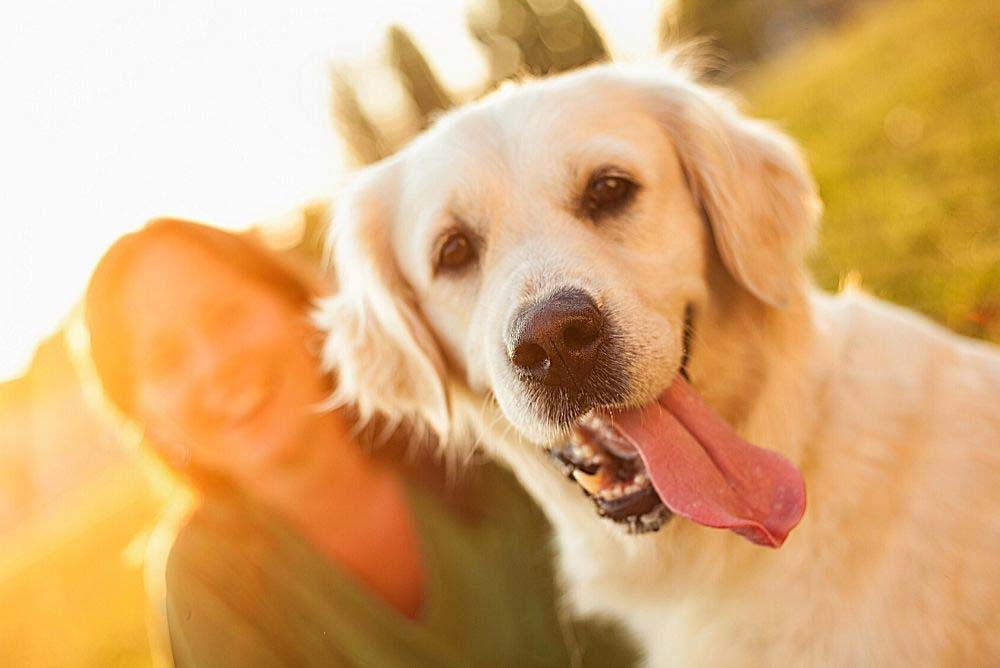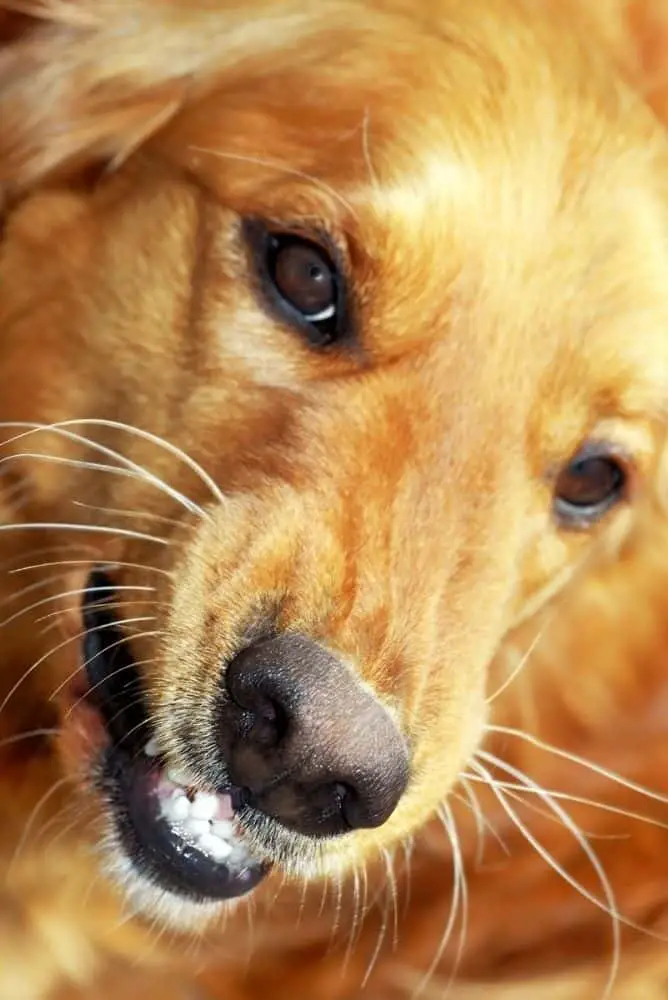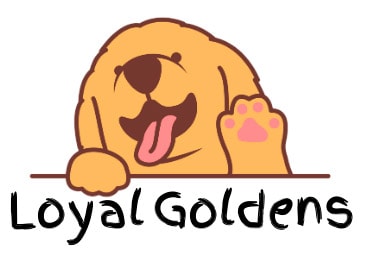You say those six magic words, “Want to go for a walk?” and your Golden Retriever shimmies with excitement. And what’s that on your beloved Golden’s face? Is your dog actually smiling?
Technically, Golden Retrievers do not really smile. What looks like a smile to us, is a canine expression that can indicate several emotional states such as relaxation, exhaustion, anxiety, or can even be a learned response. You can tell when your dog is happy by watching for other body language and behavior signals.
To learn more about what’s happening when it looks like your Golden Retriever is smiling, keep reading. I’ll show you the difference between four types of body language that can be interpreted as smiling. You’ll also find out more about the most common signs of happiness in dogs and whether your dog understands what it means when you smile.
What Could Be the Meaning of Your Golden Retriever’s “Smile”?
The expression that humans usually interpret as a smile in dogs is called “relaxed open mouth” by dog behaviorists. Golden Retrievers are especially known for this expression—with their sunny personalities and the folds of skin that turn up at the corners of their open mouths. It’s easy to interpret their relaxed open mouth expression as a smile.
But this isn’t the only canine body language that looks like smiling. Below, read about four things your Golden Retriever might be expressing when they look like they’ve got a smile on their face.
Relaxation
This is one of the two types of relaxed open mouth expressions. Most commonly, you’ll see this expression when your dog is feeling relaxed. If your Golden Retriever is laying in a favorite sunny spot and looking around at the world with what seems to be a smile, it’s probably just an indication that your dog feels content. In this way, that “smile” can be something like a human smile.

(This article may contain affiliate links and loyalgoldens may earn a commission if a purchase is made.)
Unlock your goldens natural intelligence and see just how quickly problem behaviors disappear.This is the best at home dog training I've ever used!
Exhaustion
After a good game of fetch or an energetic playdate, your Golden Retriever may be all “smiles.” This is the other relaxed open mouth expression. But be alert because there are times when this smile can be a sign that your dog is overtired. Watch to see if their tongue is hanging out—that’s an indication that they might need a break.

Anxiety
When a dog is afraid or uncertain, it may react by being submissive or by being aggressive. And in either case, it may display an anxious “smile.”
A submissive expression looks like a “toothy” grin. It might seem strange to us to show teeth as a way to say, “I’m not a threat,” but it makes sense to dogs. They accompany this with a low, relaxed body posture and squinted eyes.

Discover how to train your Golden Retriever by playing games: 21 games to play with your Golden that will make them smarter and better behaved!
An aggressive expression also uses bared teeth, but the skin around the teeth will retract more noticeably as if curling away from the mouth, and the dog’s eyes will be wide. If you see this expression, it’s a good idea to remove your Golden from whatever situation is causing fear.
If your dog seems to be anxious a lot, you can check with your vet—and there are also some great over-the-counter remedies found at amazon.com that can help you out:
- Hemp Oil for Dogs and Cats: These drops are made from healthy hemp oil and can be given directly or added to food to help calm your pet.
- CIDBEST Pet Calming Collar: The soothing lavender and lemon essential oils in this collar offer your Golden a consistent source of relaxation. Good for trips or situations where you know your Golden might get stressed.
- BeMiracle Plaid Dog Jacket Calming Vest: This snug vest is like a calming hug for your Golden—the gentle pressure helps relieve anxiety.
Bonding
Your Golden Retriever may have even learned that you like to see them “smile.” By reinforcing the behavior with treats, playtime, and your own smiles, you can teach your dog that this expression makes you happy and earns rewards. This will cause the dog to use the “smile” expression to try to please you.
Golden Retrievers aren’t the only dogs that smile…If you can’t get enough of those cute dog smiles? Check out this video:
How to Tell if Your Golden Is Happy
If smiling isn’t a great way to tell if your Golden Retriever is happy, are there any reliable signs that your dog is happy and feeling good? Absolutely! Learn to watch for both body language and behavior that demonstrate your canine companion’s happiness:
Body Language
- Relaxed: Mouth slightly open, ears and tail are neutral, soft-looking eyes, and frequent blinking.
- Excited: Head up, tail wagging freely, body wiggling, and “hopping” or “bouncing” motion.
Behavior
- Playful: “Bowing” with the front of the body low and the back of the body still standing.
- Trusting: Rolling onto their back to invite belly rubs or scratches.
- Affectionate: When your dog leans into you, looks for pets and scratches, and licks you, it’s showing love and happiness.
- Sociable: If your Golden is generally a happy dog, it will probably show excitement at meeting new people and new dogs and will want to spend time with the people it loves.
- Enthusiastic: A happy dog will be excited to go for a walk, ride in the car, and play games with you.
- Hungry: A happy dog should have a good appetite, and they’ll do a lot of hopping up and down if they’re really excited about the food you’re going to give them.
- Sleepy: Believe it or not, sleeping about 16 hours a day is a sign of a happy, contented dog.
You can learn more about your Golden’s body language with one of these great books (amazon.com):
- Canine Body Language: A Photographic Guide: This guide helpfully shows an image of each type of body language so that you’re sure about what you see in your own dog’s behavior.
- Dog Language: An Encyclopedia of Canine Behavior: While extremely thorough, this guide also features concise and easy-to-use entries.
- The Secret Language of Dogs: Unlocking the Canine Mind for a Happier Pet: Written by world-famous dog trainer Victoria Stilwell, this book is a helpful and fascinating exploration of both movements and sounds that dogs use to communicate.
If it’s helpful to see some of these behaviors in action, have a look at this video:
How Your Golden Can Tell if You’re Happy
Researchers believe that dogs are able to understand human smiles. Because dogs were domesticated 20,000-40,000 years ago, being able to interpret human facial expressions has long been useful for them. Knowing whether the humans who feed and shelter you are happy or angry is a key survival skill.
Dogs are born with an ability to notice different facial expressions in other dogs. Through experience with their human owners, dogs can learn to recognize human facial expressions, as well.
When you smile at your Golden Retriever, they experience the same kind of happiness that you do when someone smiles at you. One study found that dogs are so good at recognizing the human smile; they can even look at photographs of humans and judge which ones are smiling.
Conclusion
Although your Golden Retriever may know what it means when you smile, your dog probably isn’t smiling back—at least, not in the human sense. Dogs can make the expression that we refer to as a smile, but what that expression means for them is different from what it means for us.
A “relaxed open mouth” usually means that your Golden is relaxed or tired. When the teeth show, though, it can be a sign of anxiety or fear. Of course, your dog may have learned to smile in order to get treats or affection from you—after all, making you happy is one of your Golden Retriever’s top priorities!
Your Golden has a range of instinctive body language gestures that can tell you whether he’s happy, relaxed, frightened, or attempting to bond. Learning this dog “language” is a great way to get closer to your Golden Retriever.
More Golden Retriever Articles You’ll Love!
- Golden Ancestry: Are Retrievers Related to Wolves?
- The 19 Best Toys Golden Retrievers Will Actually Play With!
- Male vs. Female Golden Retriever – Is There a Difference?
- Are Golden Retrievers Smarter Than Other Dogs? (Explained!)
